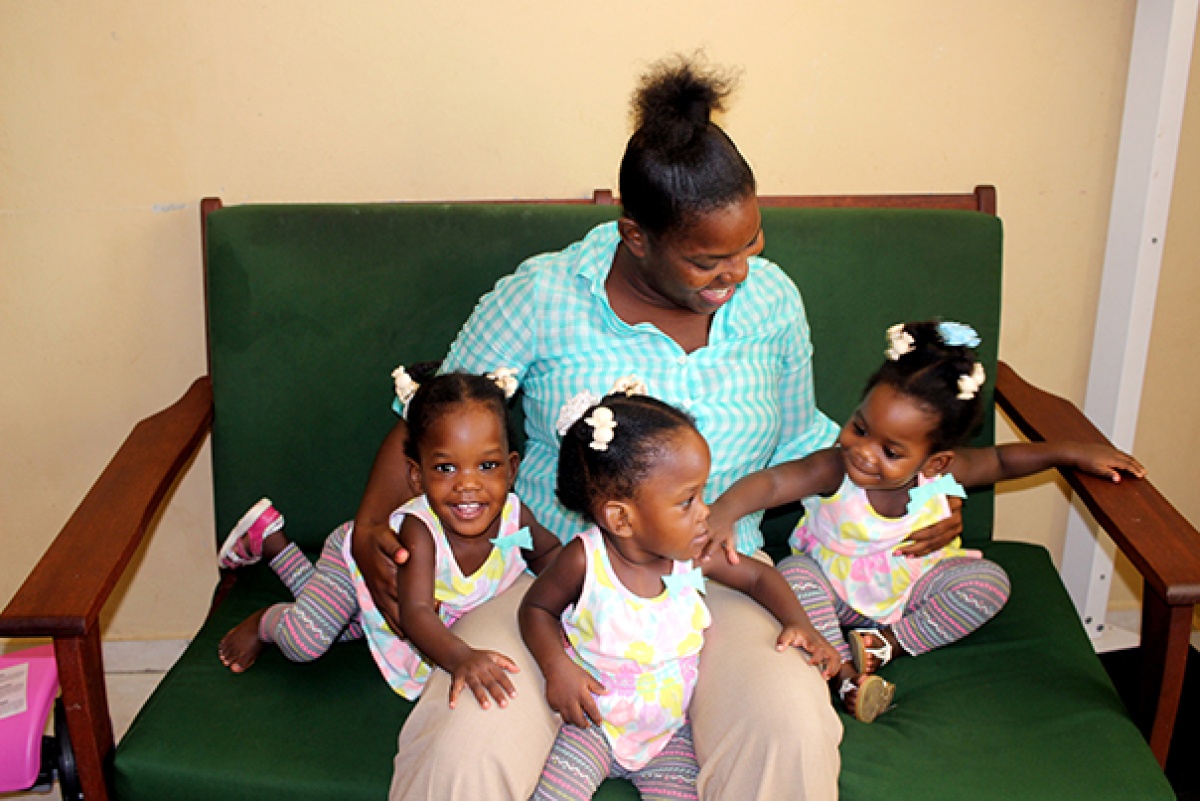One Year After Surgery, Haiti Triplets on the Move
Posted on Jul 15, 2016

The thing about triplet toddlers is that they never sit still. Twenty-month-old Tamar, Michelle, and Marian Bernard walk, run, squirm in their seats, dance, and generally create chaos for their parents, Manoucheca Ketan and David Bernard. But instead of being a headache, their movement is a source of constant relief and joy.
Just over one year ago, Michelle and Marian were conjoined at the abdomen. Clinicians from Zanmi Lasante, as Partners In Health is known in Haiti, delivered them and their triplet sister by cesarean section on November 2014 at University Hospital in Mirebalais, Haiti. At 6 months, they returned to the hospital and were separated during a procedure in which PIH doctors and nurses collaborated with a team of international experts.
The procedure was historic—the first of its kind successfully performed in Haiti and a watershed moment for PIH, which started 30 years ago as a scrappy nonprofit based out of a remote clinic in Cange. Most importantly, though, it was life-transforming for the girls and their parents.
“Looking back and realizing it’s been a year makes me so happy to see them running around the house and doing well,” Ketan says. “Sometimes I cry thinking about how happy they are.
“I think about how it could have been if they didn’t have the surgery and were still conjoined,” she adds. “The health system here is difficult for people with very common health conditions, so to have conjoined twins and think about how I was going to be able to raise them was hard. I am so blessed.”
Bernard remembers wondering whether they should go through with the surgery as “what ifs” flooded his mind. But doctors at University Hospital reassured him and Ketan and answered all their questions. On the morning of May 22, 2015, the couple gave Marian and Michelle a final hug and handed them to awaiting nurses.
Within seven hours, Marian and Michelle were separated. Within 48 hours, the girls were breathing on their own. Within 72 hours, they’d had their first bottles. And within two weeks, they had left the neonatal unit to return home to their parents and sister, Tamar.
Although they had undergone a major procedure, neither girl suffered debilitating side effects. Each girl’s head had become twisted to one side since birth as they adjusted to life together. Now that they were apart, they required physical therapy to relax and retrain their neck muscles. PIH physical therapists and visiting specialists led the infants through various exercises and taught Bernard and Ketan how to continue the work at home. Months into therapy, both developed full range of motion in their necks.
“After the separation, parts of their bodies were crooked,” Ketan says. “But after physical therapy, both at home and at the hospital, they started to get better.”
 |
|
Michelle and Marian Bernard, 20 months, share a step near their home in Mirebalais, Haiti. |
Ketan lovingly calls her daughters dezod, Krèyol for rambunctious, and watches them tear around the family’s apartment in Mirebalais, just blocks from University Hospital. The three toddle around, pulling out chairs and climbing on top of everything. They dance whenever they hear music. And they walk around “talking” on their toy phones all day, even though their vocabulary doesn’t extend much beyond mom and dad.
The girls’ personalities have emerged over time too, Ketan says. Michelle is practical and gets into everything, while Marian keeps to herself. Tamar is the social one and acts like an older sister charged with protecting her siblings. Michelle prefers playing with Tamar and ever since she started biting, her sole target is her formerly conjoined twin. Their mother admits she sometimes gets confused and calls them all by the wrong names.
“It’s magical watching them,” Ketan says with a smile. “Sometimes they do things that surprise me, like when they fight over the same toy when they have so many other toys they could play with.”
“Every day there is something different about them,” Bernard says. “The way they eat, laugh, play.”
The past year has given Ketan and Bernard time to reflect on what they’ve been through and how they want to share their experience. She teaches community members seeking prenatal care and has started working with nurses and translators in University Hospital’s neonatal and pediatric intensive care unit. And the couple has written a memoir, to be released next May on the second anniversary of their daughters’ surgery. The book was a way for them to share their story, emphasize the importance of prenatal care, and educate others—especially expecting couples—about the medical possibilities for conjoined twins.
“It’s important for people to know that this separation happened in Haiti, to know it’s possible,” Ketan says. “We want our story to be an example for others.”

